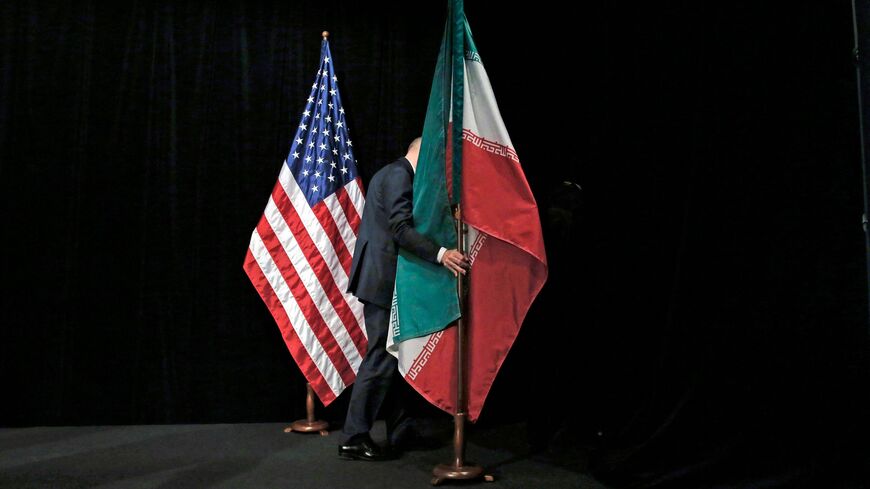“I can say they are close”
The Biden administration, discarding for now any hopes of a revised Iran nuclear deal, is instead pursuing an understanding with Iran that goes something like this, according to press reports:
- Iran would pause its enriched uranium at 60%, and avoid approaching 90%, the level needed for a weapon; refrain from installing more advanced centrifuges and expanding its uranium stockpiles; and maintain cooperation with the International Atomic Energy Agency (IAEA), including resolution of outstanding safeguards issues (more on this below).
- The United States has said that "all options are on the table" if Iran crosses the enrichment red line, or is caught in a sneak-out or breakout run at a weapon. Israeli threats of force complement the US warnings, which are backed by a substantial deterrent posture.
- The United States would facilitate the release of frozen Iranian funds and hold off on further punitive sanctions or censure by the UN Security Council and the IAEA, assuming Iranian compliance. Washington this week approved the release of $2.7 billion for Iraq to pay Iran for electricity and gas. The State Department described this as a routine sanctions waiver, but timing is everything. Talks are also reportedly progressing for South Korea to pay $7 billion owed Iran, also tied up because of US sanctions.
- Iran would release US citizens Siamak Namazi, Emad Shargi and Morad Tahbaz, all unjustly detained in Iran. “I can say they are close,” Oman Foreign Minister Sayyid Badr Albusaidi told Elizabeth Hagedorn about a potential US-Iran prisoner agreement. “This is probably a question of technicalities. … They need to have a framework [and] a timeframe of how this [the release of frozen funds] should be orchestrated.”
Diplomacy, deterrence and Israel
The Biden administration is also seeking a de-escalation with Iran in the region, backed by diplomacy and a robust deterrent posture.
Toward this end, the United States has encouraged diplomacy by its regional partners with Iran, including the Iran-Saudi rapprochement, even though brokered by Beijing.
Iran President Ebrahim Raisi, for his part, has given priority to diplomacy with regional powers and leveraging relations with Russia and China, to expand its influence, mitigate the effects of sanctions and deter threats from the United States and Israel.
Tehran may feel good about its regional influence. Hezbollah, backed by Iran, will be the final arbiter of Lebanon’s next president; no change there. The Arab League’s normalization with Syria is considered vindication of Iran’s support of President Bashar al-Assad; its influence in Damascus is secure.
The power brokers in Iraq’s ruling coalition, the Coordination Framework, are longtime partners, and in some cases proxies, of Iran. There is no need for Iraq to be a US-Iran battleground, for now, as Iran’s people hold the power. And Iraq, trusted by both Washington and Tehran, has helped facilitate the release of frozen Iranian funds.
The US-Iran detente extends to the Persian Gulf, where the US Navy holds sway. Tehran wants its oil traffic to sail without US seizure or harassment, and the United States wants Iran to stop attacking and harassing shipping.
The Biden administration is backing up its emphasis on de-escalation with a heightened deterrent posture, seeking to reassure Gulf capitals uneasy about what they perceive as a lack of clarity about US policy in the region, especially after Iran seized two oil tankers on April 27 and May 3.
It was no coincidence, as we reported last week, that combat aircraft from Israel, Jordan and the kingdom flew alongside US B1 Bombers in a display of force directed at Iran, as US Secretary of State Antony Blinken met with regional leaders in Riyadh.
While Israeli Prime Minister Benjamin Netanyahu hates the idea of any understanding or agreement with Iran, there’s little he can do about it, as Ben Caspit reports. The silver lining is Biden’s commitment to try to expand the Abraham Accords to the kingdom.
Brokering a Saudi-Israel rapprochement is central to US deterrent policy. The security implications of a US-Israel-Saudi-UAE-Bahrain alignment does not sit well in Iran.
Khamenei: Do just enough with the IAEA
Iran is signaling that, under the right conditions and incentives, it is willing to accept its role as a responsible nuclear power and signatory to the Nuclear Nonproliferation Treaty (NPT), but not necessarily more than that, as we reported here in March.
Supreme Leader Ayatollah Ali Khamenei made this clear in a speech to nuclear officials and experts on June 11, in which he “strongly recommended” continued cooperation with the IAEA, but only “within the framework of safeguards agreements.”
“Do not accept to do more than that,” he added, “and [only] do what we need to do according to the safeguards agreements,” which is required as an NPT signatory.
The IAEA has recently shelved some longstanding files regarding questions about undeclared nuclear activities, and Iran has agreed to reinstall cameras and monitoring equipment at key facilities.
The United States, as part of its understanding with Iran, will expect this progress to continue.
Iran now is a permanent “threshold’ nuclear weapons state — like Japan, or Brazil, or South Africa. Its deliberate ambiguity can serve as both deterrent to adversaries, and incentive for further negotiations and deal-making.
Khamenei, in his speech, said that pursuing or not pursuing a nuclear weapon is Iran’s choice. “If it weren’t for our belief [opposing nuclear weapons], and if we had wished to pursue these, they wouldn’t have been able to stop us, in the same way that they haven’t been able to stop our nuclear development up until now. And they won’t be able to do so in the future!,” he said.
Flashpoints and snapbacks
In October, UN-imposed restrictions on Iran’s development, procurement, and sale of missile and related technologies linked to possible nuclear weapons delivery will expire, per the provisions in the Joint Comprehensive Plan of Action (JCPOA), or Iran nuclear deal.
The expiration of these sanctions is a key benchmark of the JCPOA, and will not go unnoticed, including by those concerned about Iran’s nuclear program, and those wary of any dealings with Iran.
Russia and China, also signatories to the JCPOA, may be eager to sell missile technology to Iran.
Iran’s commitment to engage with the IAEA may, in part, be designed to avoid what are called “snapback” sanctions — that is, the reinstatement of all sanctions that had previously been lifted under the JCPOA, if Iran is deemed in violation of the agreement.
Because the United States withdrew from the JCPOA in 2018, another signatory — the United Kingdom, France or Germany — would need to initiate snapback, which could be difficult, if Iran is cooperating with the IAEA.
“If you need a legal rationale for snapback, there are plenty, including Iran’s enrichment of uranium at 60% which is prohibited in the JCPOA,” said Stephen Rademaker, a former US assistant secretary of state for nonproliferation.
Another flashpoint for snapback could be Iran’s export of armed drones to Russia, which Iran denies. For the West, Iran and China can’t be Russia’s strategic depth in the war in Ukraine. As we reported in March, Iran would consider separate negotiations on its role with Ukraine and the European Union, but distinct from the nuclear talks, and in the context of Iran’s respect for Ukrainian sovereignty and territorial integrity.
Eyes on 2024
China is also part of the calculation in both Washington and Tehran. As the United States makes China the focus of its national security strategy, Iran and China are expanding their diplomatic, security and military ties. Beijing is also positioning itself as a regional broker, playing both sides of the Persian Gulf. Joyce Karam has the report here on the Arab-China business summit in Riyadh just days after Blinken left the kingdom.
With the move toward detente, both Washington and Tehran may in part also be buying time based upon the 2024 US presidential election. There is little constituency in the United States for any type of deal with Iran, and probably zero in the Republican party. If Biden wins reelection, there may be the prospect of a more expansive deal. If a Republican wins, Iran might expect a more aggressive adversarial approach from Washington.









